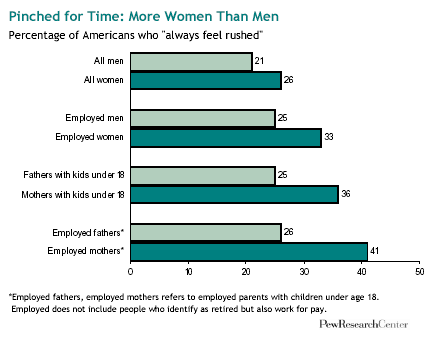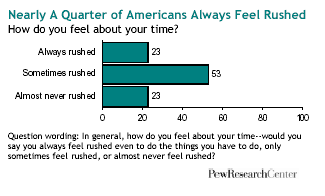 Everybody gets the same 24 hours in a day, but women are slightly more likely than men to feel starved for time.
Everybody gets the same 24 hours in a day, but women are slightly more likely than men to feel starved for time.
About a quarter of all women (26%) say they “always feel rushed,” while 21% of men report feeling that way, according to a new Pew Research Center survey.
This gender gap is bigger for women who are mothers and for women who are in the work force. And it grows to 15 percentage points for women who are both. A breakdown:
- Working women (33%) feel more rushed than do working men (25%) – an 8 percentage point gender/employment gap.
- Mothers of minor age children (36%) feel more rushed than do fathers of minor age children (25%) – an 11 percentage point gender/parenting gap.
- Combining those two categories, working mothers with minor children (41%) feel more rushed than do working fathers with minor age children (26) – a 15 percentage point gender/employment/parenting gap.
 The findings are based on a telephone survey of a nationally-representative, randomly-selected sample of 3,014 adults conducted from Oct. 5 through Nov. 6, 2005.
The findings are based on a telephone survey of a nationally-representative, randomly-selected sample of 3,014 adults conducted from Oct. 5 through Nov. 6, 2005.
Overall, about a quarter (23%) of all adults in this country say they always feel rushed, while a majority (53%) of Americans sometimes feel rushed and about a quarter (23%) almost never feel rushed.
Other Demographic Considerations
There are no significant differences in “feeling rushed” by income or by education level. Nor does it matter much if you live in a city, a suburb or a rural area – all those stereotypes about the hustle and bustle of city life notwithstanding.
Whites, blacks and Hispanics are about equally likely to feel rushed; blacks, however, are more likely than whites to say they “almost never feel rushed.”
The elderly (ages 65 and older) are less likely than young and middle-aged adults to feel rushed. Along those same lines, the survey finds that employed adults (29%) are nearly three times more likely than retirees (11%) to report that they always feel rushed. The bulk of retirees are evenly split between those who almost never feel rushed (45%) and those who sometimes (42%) feel that way. But even here, there is a gender gap – retired women (14%) are a bit more likely than retired men (8%) to report feeling rushed.
Moms Are More Rushed Than Dads
People with children under age 18 feel more rushed than do adults with grown children or with no children. However, this association between parenting status and feeling rushed is stronger among women than men.
More than a third of women (36%) with minor age children always feel rushed, compared with 25% of men in the same situation. Men and women with only adult age children are less likely to feel rushed; just 13% of men and 19% of women in this situation feel this way. About the same proportion of men (23%) and women (24%) without children feel rushed.
Single parents are more likely than married couples with children under 18 to feel rushed (35% among unmarried parents compared with 29% among married). But here too, gender is important. Nearly four-in-ten (39%) single moms with minor age children always feel rushed, compared with 30% of single dads who feel this way.
Working Moms Are the Most Rushed
Employed women (33%) feel more rushed than do women who don’t work outside the home (24%), and working moms who have minor age children are the most time pressured of all. Some 41% of them say they always feel rushed, compared with 25% of stay-at-home mothers of minor children, and with 26% percent of working fathers with minor children. Working mothers with grown children feel less time pressured. Just 27% of working mothers whose children are all ages 18 and older say they always feel rushed.
Can Hired Help Buy Relief from Time-Pressures?
Not surprisingly, people who say they always feel rushed also express less overall satisfaction with many aspects of life. For example, only 27% of those who are always rushed say they are generally very happy with life compared with 34% of all adults who say the same. Similarly, the “always rushed” are less likely to be very satisfied with their free time, their family life, housing situation, household income, standard of living, and (among the employed) with their jobs. Keep in mind, these data do not tell us whether feeling rushed leads to dissatisfaction or vice versa.
But it is clearly a problem for many people – especially working mothers, who deal with multiple responsibilities both inside and outside the home. Can they buy any relief? It’s not clear. Our survey finds that those who have hired help for household chores – 16% of the adult population – feel just as rushed as those who don’t.
About the Survey
Results for this survey are based on telephone interviews conducted with a nationally representative sample of adults, ages 18 years and older, living in continental U.S. telephone households.
- Interviews conducted October 5-November 6, 2005
- 3,014 interviews
- Margin of sampling error is plus or minus 2 percentage points for results based on the total sample at the 95% confidence level. The margin of sampling error is higher for results based on subgroups of respondents.
Survey interviews conducted under the direction of Princeton Survey Research Associates International. Interviews were conducted in English and Spanish.
In addition to sampling error, bear in mind that question wording and practical difficulties in conducting surveys can introduce error or bias in the findings of opinion polls.
Read the full report for more details.


